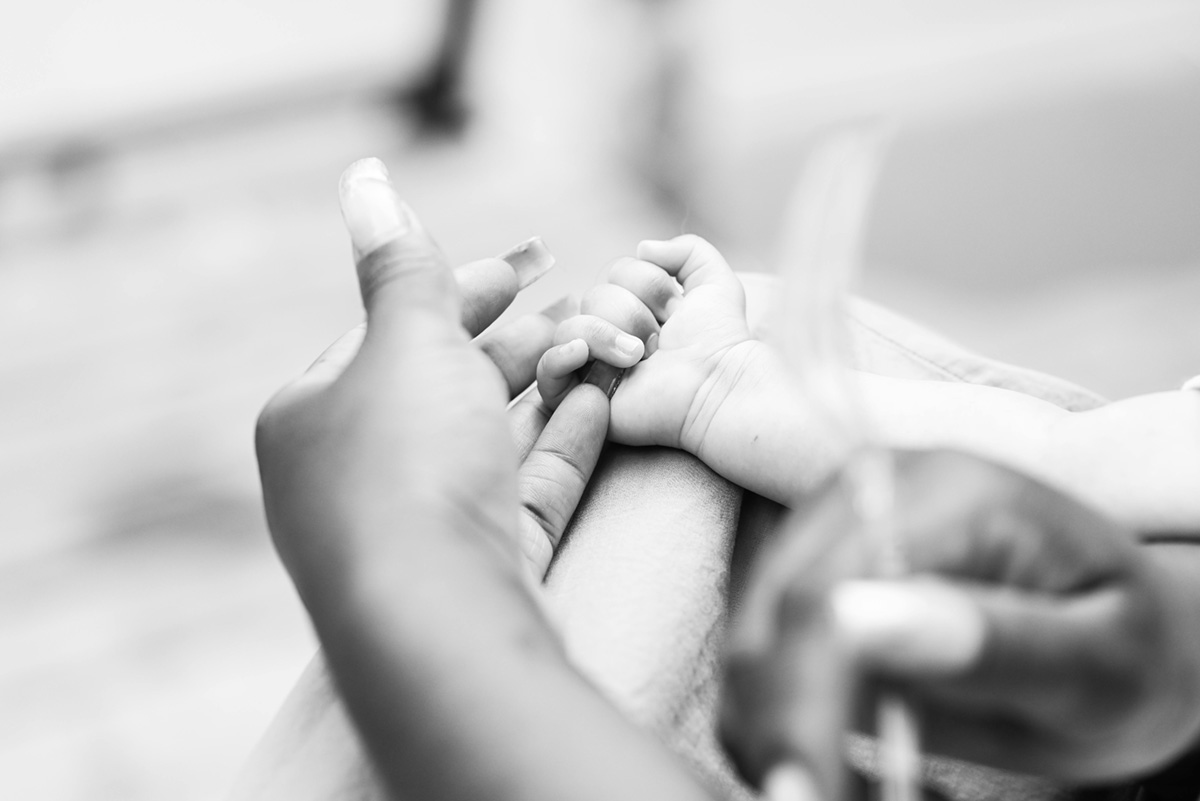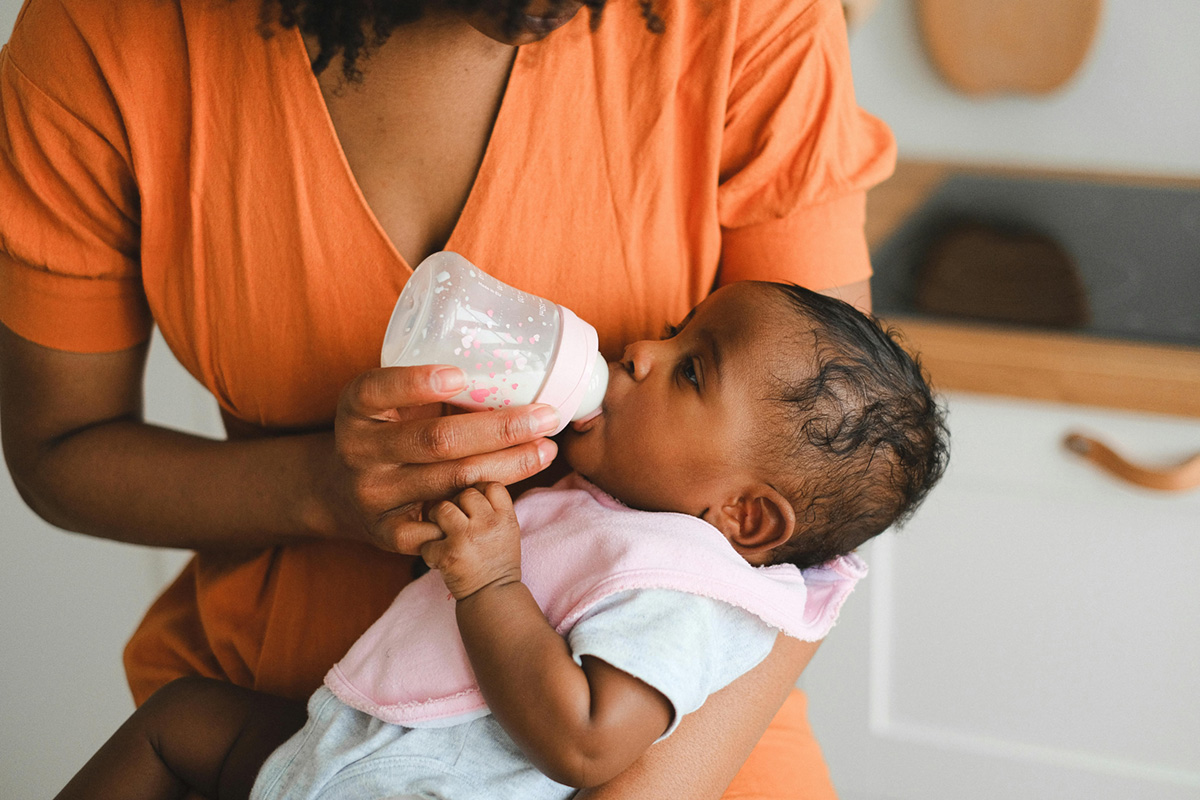Black Maternal Health as a Reproductive Justice Issue
Black birthing people have unacceptably poor maternal and infant health outcomes in the U.S— including staggering rates of preventable illnesses and deaths related to pregnancy and childbirth. Reproductive Justice can only be achieved when Black women, girls, and gender-expansive individuals can experience pregnancy and childbirth without endangering our lives. The United States has the highest maternal and infant mortality and morbidity outcomes than any other industrialized nation, which disproportionately impacts Black birthing people in the U.S. due to vast racial disparities. Yet, Black birthing people have unacceptably poor outcomes in the U.S— including staggering rates of death related to pregnancy and childbirth. At the heart of America’s maternal health crisis is a woefully fragmented health care system that perpetuates vast racial disparities in maternal and infant morbidity and mortality.
The Black maternal health crisis1 represents a preventable tragedy. According to the CDC, more than 80% of pregnancy-related deaths in the United States can be prevented through recognizing warning signs, providing timely treatment, and ensuring quality care. This statistic is particularly alarming for Black women, who are two to three times more likely to die from pregnancy-related causes than white women. These disparities in maternal mortality persist regardless of income or education level, highlighting a systemic issue requiring immediate intervention through policy reform, healthcare improvements, and community-based solutions.

The Black Maternal Health Crisis in America
The Black maternal health crisis in the United States reflects significant racial inequities in outcomes:
- The U.S. has an overall maternal mortality rate of 32.9 deaths per 100,000 live births – the highest among high-resource countries2
- Black women experience the highest rates of maternal mortality in the country
- Black women are 2-3 times more likely to die from pregnancy and childbirth-related causes compared to women of other races and ethnicities3,4
- Black newborns face the highest infant mortality rate – more than double the rate of white babies5
- These disparities persist regardless of income or education level, highlighting systemic issues in maternal care6
How Structural Racism Impacts Black Maternal Health Outcomes
Structural racism and the resulting biased health care system contribute to Black women’s poor health outcomes, including maternal mortality. Systemic barriers that Black women face include racism, sexism, and income inequality that result in lower wages. As a result, too often, we have to choose between essential resources like safe housing, childcare, food, and medical care.
Despite the positive impacts of the Affordable Care Act (ACA) and Medicaid’s expansion from 60 days of postpartum coverage to one year postpartum in certain states, Black women are still more likely to be uninsured, face greater financial barriers to health care services, and have less access to timely prenatal care. Additionally, Black women experience higher rates of chronic health conditions that may worsen maternal and infant health outcomes—including diabetes, hypertension, obesity, and cardiovascular disease.7
Research points to substandard care at hospitals, driven by anti-Black racism and discrimination, as another critical driver of disparities across the care continuum. These include overt acts of interpersonal discrimination. On a broader level, implicit biases, stereotypes, and institutional and structural discrimination harm Black birthing people and their families. The inequities and exposure to racism that Black women experience throughout their lives, including while seeking health care, increases health risks and drives racial disparities in preventable maternal and infant deaths.
According to a 2024 In Our Own Voice: National Black Women’s Reproductive Justice Agenda national poll, nearly one-quarter of Black women 18 to 44 surveyed felt worried about their health and safety during pregnancy or childbirth because of their race. Nearly 20 percent reported feeling that a health care provider didn’t take their pain seriously during pregnancy or childbirth because of their race and/or gender.

Birth Justice and Reproductive Rights for Black Mothers
The impact of this structural racism is clearly indicated by findings about what happens when newborn Black babies are cared for by Black clinicians. When Black babies are treated by Black providers (e.g., pediatricians, neonatologists, family practitioners), their mortality rate compared to white newborns is halved.8 Black midwives have been a pillar of Black communities since the antebellum period. Forcibly, they cared for enslaved birthing Black women and their infants on plantations and provided critical care to newly freed reproducing Black women. In the late 19th to early 20th century, the privatization of medicine, increased hospitalization of childbirth, and racist stigmatization of Black health care providers decimated Black midwifery; white male physicians, eager to “found” the field of obstetrics and gynecology, often collaborated to push Black midwives out of the delivery room through legislation, misinformation.9 Black midwives were, and remain, critical practitioners, especially in rural and remote areas or regions where physicians do not provide care to Black people.
Achieving better outcomes for Black women, birthing people, and babies requires a commitment to birth justice—including increasing the availability of Black midwives and doulas. Birth justice is achieved when individuals can make informed decisions during pregnancy, childbirth, and postpartum, that is free from racism, discrimination of gender identity, and implicit bias. Birth justice requires that individuals fully enjoy their human rights regarding reproductive and childbirth-related health decisions, without fear of coercion, including coercion to submit to medical interventions, reprisal for refusal of care, and/or face the threat of inadequate medical care. Birth justice centers the intersectional and structural needs of individuals and communities.10
Community-based organizations11 are at the forefront of the birth justice movement, addressing the Black maternal health crisis. They provide essential resources such as doula services, education, and advocacy. These organizations serve as vital intermediaries between individuals and policymakers, creating career pathways for Black women in maternal health and providing culturally congruent care that improves outcomes. The work of these organizations is critical because health isn’t produced solely in clinical settings, but in people’s homes, communities, and workplaces. Supporting these community-led efforts has been written into policy proposals like the Momnibus and the White House Blueprint for Addressing the Maternal Health Crisis.
Policy Progress on Black Maternal Health EquityProgress
Thanks to the tireless efforts of Reproductive Justice and Black birthing advocates nationwide, addressing Black maternal mortality and morbidity has become a key policy priority for federal and state lawmakers in recent years. This increased focus has resulted in notable policy progress, including the Biden-Harris Administration’s successful push for states to expand Medicaid coverage to 12 months postpartum under the American Rescue Plan. More than three dozen states, the District of Columbia, and the U.S. Virgin Islands have adopted this expansion.
Expanding telehealth services represents another promising approach to improving Black maternal health outcomes. Telehealth allows more Americans to video conference with doctors, check test results online, and remotely monitor health conditions. One study found that implementing telehealth for postpartum care during the COVID-19 pandemic was linked to decreased racial disparities in postpartum visit attendance. This digital approach to maternal care can help overcome barriers like transportation, childcare, and work schedules that disproportionately affect Black mothers.
The Black Maternal Health Momnibus Act: Comprehensive Policy Solutions
The Black Maternal Health Momnibus Act represents the most comprehensive legislative approach to addressing America’s maternal health crisis. Introduced by Representative Lauren Underwood, Representative Alma Adams, and Senator Cory Booker, this package of 13 individual bills takes action through historic investments addressing every driver of maternal mortality and disparities in the United States.
The Momnibus Act includes provisions to:
- Make critical investments in social determinants of health like housing, transportation, and nutrition that influence maternal health outcomes
- Provide funding to community-based organizations that are working to improve Black maternal health outcomes and promote equity
- Grow and diversify the perinatal workforce to ensure every mom receives maternal care from providers they trust
- Improve data collection processes to better understand the causes of the maternal health crisis and inform solutions
- Support mothers with maternal mental health conditions and substance use disorders
- Improve maternal care for incarcerated mothers
- Invest in digital tools to improve maternal health outcomes in underserved areas
- Address climate change-related maternal health risks for mothers and babies
- Promote maternal vaccinations to protect the health of mothers and babies
Since 2023, the Black Maternal Health Caucus has enacted over $200 million in Momnibus funding through the federal appropriations process, demonstrating growing momentum for addressing the Black maternal health crisis through comprehensive policy solutions.

Key Policy Recommendations to Improve Black Maternal Health Outcomes
Despite ongoing legislative efforts, Black women in America continue to face disproportionate risks during pregnancy and childbirth. The following policy recommendations target specific interventions needed to address the maternal health crisis affecting Black communities:
- Extend Postpartum Medicaid Coverage: Require all states to extend comprehensive, holistic maternal care and newborn care for a minimum of one year postpartum, as states with extended coverage show lower rates of maternal mortality, particularly for Black women
- Eliminate Financial Barriers to Care: Remove cost-sharing for preconception care, labor, delivery, and pregnancy-related labs, mental health, and postpartum visits to ensure equitable access to quality maternal care
- Support Midwives and Doulas: Require coverage for doulas and midwifery care in insurance programs and increase funding for these services in federal health care programs, as people who receive care from midwives are less likely to have preterm births and C-sections
- End Criminalization of Pregnancy: End coercive, non-consensual drug testing and criminalization of substance use for patients, including pregnant people, which disproportionately affects Black women
- Pass Comprehensive Legislation: Pass the Black Maternal Health Momnibus Act, CARE for Moms Act, and other legislation that advance Black maternal health outcomes
Join In Our Own Voice Action Fund in advocating for policies that address the Black maternal health crisis and advance reproductive justice for all.
1 CDC’s Office of Women’s Health. CDC, 2024: https://www.cdc.gov/womens-health/features/maternal-mortality.html.
2 Hoyert DL, Maternal mortality rates in the United States, 2021, National Center for Health Statistics, Health E-Stats. 2023. DOI: https://dx.doi.org/10.15620/cdc:124678.
3 Centers for Disease Control and Prevention (CDC), Pregnancy Mortality Surveillance System, Atlanta (GA): CDC, 2023. https://www.cdc.gov/nchs/data/hestat/maternal-mortality/2023/maternal-mortality-rates-2023.htm.
4 Hoyert DL, Maternal mortality rates in the United States, 2021, National Center for Health Statistics, Health E-Stats, 2023. DOI: https://dx.doi.org/10.15620/cdc:124678.
5 Winny A, Bervell R, How Can We Solve the Black Maternal Health Crisis? Johns Hopkins Bloomberg School of Public Health, 2023: https://publichealth.jhu.edu/2023/solving-the-black-maternal-health-crisis.
6 Centers for Disease Control and Prevention (CDC), Infant Mortality, Atlanta (GA): CDC, 2022. https://www.cdc.gov/maternal-infant-health/infant-mortality/
7 Doshi RP, Aseltine RH, Sabina AB, Graham GN, “Racial and ethnic disparities in preventable hospitalizations for chronic disease: prevalence and risk factors,” Journal of racial and ethnic health disparities, 2017; 4(6): 1100-1106.
8 Cunningham A, “What we can learn from how a doctor’s race can affect Black newborns’ survival,” Science News, August 25, 2020. https://www.sciencenews.org/article/black-newborn-baby-survival-doctor-race-mortality-rate-disparity.
9 Smithsonian Institution (SI), The Historical Significance of Doulas and Midwives, Washington (DC): SI, no date. https://nmaahc.si.edu/explore/stories/historical-significance-doulas-and-midwives
10 Ancient Song Doula Services, Full Spectrum Doula Training, Montclair (NJ): Ancient Song Doula Services, 2018. https://www.ancientsongdoulaservices.com/training.
11 Winny A, Bervell R, How Can We Solve the Black Maternal Health Crisis? Johns Hopkins Bloomberg School of Public Health, 2023: https://publichealth.jhu.edu/2023/solving-the-black-maternal-health-crisis.
